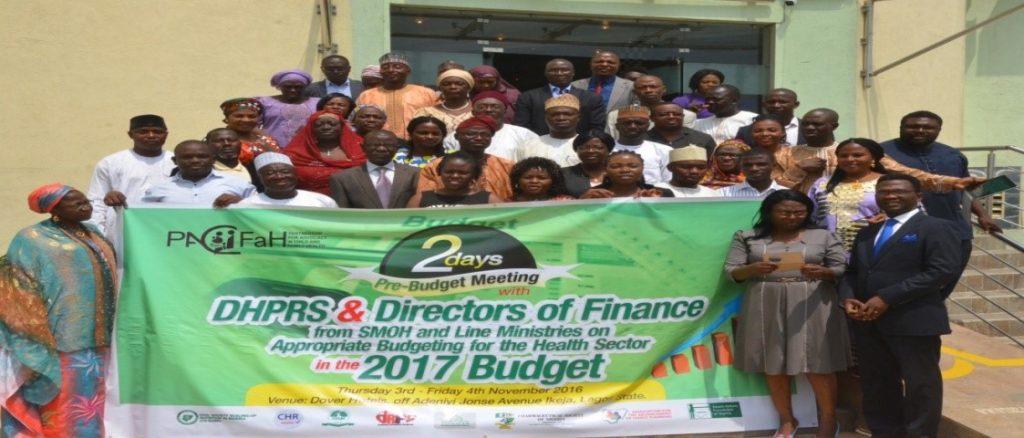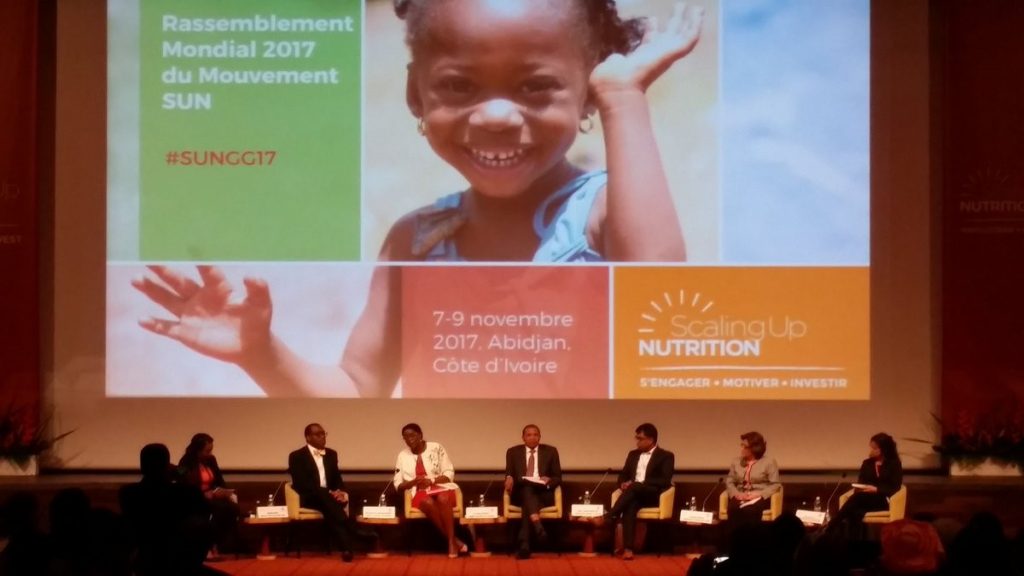PROJECT BACKGROUND
The problem we wanted to solve/Project overall goal (from the project proposal)
Statistics convey that Sub-Saharan Africa continues to bear the burden of undernourished children in the world. Unless something drastic is done, the achievement of related Sustainable Development Goals by African countries remains elusive. In Nigeria, the poor nutritional status of under-five children calls for urgent attention as malnutrition prevalence, especially stunting in some states is higher than the regional average. According to the 2020 Global Nutrition Report, Nigeria has shown no progress towards achieving the Global Nutrition Target for obesity, with about 13.1% of women and 4.6% of men living with obesity. Malnutrition has tangible impacts on the economy and social development, by undermining potential future earnings by as much as 20%, as well as inhibiting economic growth by as much as 3% of GDP.
The Nigerian government aims to reduce the rate of malnutrition in Nigeria by 50% and also increase the exclusive breastfeeding rate in Nigeria to 65% by 2025 Ref. The government has also tried to tackle the issue of malnutrition via several interventions locally. However, one of the missing links in these efforts of reducing malnutrition is youth involvement.
To support National efforts at addressing the challenge of malnutrition, this project sought to create awareness of nutrition among young people using various social media platforms. This drew the linkages of harmful dietary practices and their implications on the family, community, and the future. The project placed on spotlight sustainable nutrition pathways for young people encompassing strategic elements around health, food/nutrition security and safety, agriculture, climate change, gender, micro-nutrient, and child feeding angles. Furthermore, the project aimed to contribute to increasing nutrition perception as a developmental necessity for social protection, as well as growth and stability in Nigeria by leveraging available Social Media platforms. The project’s overall goal is to increase knowledge, awareness and participation of Nigerian youth on issues relating to nutrition through the power of social media.
Project expected results (from the project proposal)
Through this project:
- An opportunity for youth involvement in National discussions on malnutrition will be provided.
- General awareness of young persons in Nigeria on nutrition issues will be increased.
- There will be an Increased knowledge and engagement of Nigerian youths on nutrition issues
Project outcomes (from the project proposal)
The main outcome of the project is to educate Nigerian youth on the importance of proper nutrition, especially for ‘Under 5’ children, and also to provide support to CS-SUNN as an intern.
| Outcome | Activities | Comments |
| Outcome 2 The contribution of young people to the implementation of the National Strategy secured. | Activities1.1 Monthly appearance on a radio platform to discuss the importance of adequate nutrition1.2 Weekly blog posts on the website or monthly publication on a local or international newspaper site1.3 Weekly posts on personal and CS-SUNN’s Social Media platforms | Public awareness of malnutrition and exclusive breastfeeding will significantly improve the knowledge of the general public on the need for adequate nutrition thereby contributing to improved nutrition outcomes for Nigeria. |
| Outcome 2The contribution of young people to the implementation of the National Strategy secured. | Activities: 2.1 Conduct webinar to consolidate input of young Nigerians into project activities and blog posts | Outcome 1 Public awareness of malnutrition and exclusive breastfeeding was raised. |
| Outcome 3Provide technical support to CS-SUNN as an intern using my 7 years of experience as an activist. | Activities:3.1 Technical support to CS-SUNN plans and engagements. | Securing the contribution of young people in the implementation of national nutrition strategies will ensure nutrition programming coverage for young people. |
OUR APPROACH
In a bid to increase the knowledge of youths through awareness creation on nutrition issues and solutions, CS-SUNN identified 15 topics that relate to adolescents/youth nutrition. strategy, in the topics, were delivered via discussions, publications, campaigns, webinars and blog posts across relevant media platforms. Key topical issues discussed were; obesity, anaemia, nutrition in school curricula, agriculture, mental health, food safety, COVID-19, and dietary practices among others. Several youth leaders, groups, and others were engaged to both facilitate and contribute to
CS-SUNN made three appearances (one per month) on radio stations (Armed Forces Radio, Kiss and Vision FMs) to discuss some of the aforementioned issues. CS-SUNN went beyond expectations of not only publishing 8 articles on our blog but also publishing three (one per month) articles in National Newspapers (Daily Trust, Leadership and People’s Daily Newspapers).
CS-SUNN also harnessed the power of social media in achieving the goal of getting young people to understand nutrition and how to prevent malnutrition. Prior to the ban of Twitter in Nigeria, CS-SUNN develop clear and effective messages with social cards, collaborated with about six social media influencers, her state chapters and nutrition partners in Nigeria to conduct six engaging and participatory tweet chat campaigns with hashtags #YL4N #YLSN. Following the ban, the remaining campaign was conducted via Facebook and ads. The campaigns were very engaging with huge participation of young persons, youth groups, NGOs, government parastatals, and civil society.
Finally, a webinar on Youths 4 sustainable nutrition was held which drew close to 74 participants. The focus was to spark up a conversation between young persons, the government and CSOs on the current nutritional situation among young persons in Nigeria. It looked at the impact of existing nutrition policies and interventions targeting malnutrition among young people. The meeting extracted commitments to promoting nutrition among young people in a sustainable way from Federal Ministries, CSOs and Youths.
A key achievement of the project is the strong collaboration forged with the Federal Ministry of Education, National Association of Nigerian Students, National Youth Council of Nigeria, Media Organizations, Social media influencers, Community Action for Food Security, Save the Children Nigeria, NG SDGS and the Zambian SUN CSN. These collaborations are key to strengthening advocacy voices and broadening systems change for improved nutrition among youths in Nigeria.
OPPORTUNITIES
- Future collaboration with the Federal Ministry of Education and Federal Ministry of Youth and Sports and identified youth-led organizations.
- Promote nutrition education and awareness among youths during their national assignment under their National Youth Service Scheme
- Collaborate with the Ministry of Education to streamline and institutionalize nutrition education by establishing nutrition clubs in schools in Nigeria.
our success story
KEY RESULTS
CS-SUNN’s engagement and collaborations with youth groups, youth-related government Ministries, Department and Agencies, social media influencers and On-Air Personalities across some radio stations and editors of some newspaper organizations using effective messages (including development and sharing “nutrition news-worthy content with the media) enabled CS-SUNN to:
1) Lead momentum towards improved public awareness of nutrition issues and drove actionable commitments and contributions of young people for sustained nutrition in Nigeria.
2) CS-SUNN Survey on the impact of the program with 12 respondents had 33.3% of the respondents saying they were uninformed about youth and nutrition-related matters before the program while 58.3% strongly agreed that CS-SUNN campaigns and activities on youth and nutrition issues increased your knowledge on the issue at the end of the program.
3) In line with attaining improved knowledge, CS-SUNN achieved wide reach and engagements in the social media space via campaigns. Metrics from Twitter and Facebook campaigns showed excellent and impactful engagement rates.
4) Key performance indicators used to measure campaigns showed CS-SUNN made a total of 2000. 8K (233,893) impressions via the Twitter campaigns and recorded an engagement rate of 4K (4449). The Facebook campaign reached 2025 people with an engagement rate of 699.
5) Five key commitments towards sustained nutrition for youths in Nigeria were secured:
CS-SUNN
- CS-SUNN is committing to support and partner with the FMoE to institutionalize food and nutrition clubs in primary and secondary schools.
- We are also willing to work with FMoE to establish nutrition CDS at NYSC in the next NYSC batch. We will look at when the next batch is starting and then spark up conversations on that.
- We will also engage our state chapters to Sustain a convo around youth involvement.
SAVE THE CHILDREN
We will continue engaging the youth to find out what nutrition issues are affecting them and empower them to lend their voices by inviting them to policy dialogues and providing them with platforms where they can speak up and influence decisions.
COMMUNITY ACTION FOR FOOD SECURITY
We have been engaging secondary school students to teach them about nutrition and have established 2 gardens from that. We will continue to do this and also engage policymakers to ensure that young people are carried along in decision-making processes.
FEDERAL MINISTRY OF EDUCATION
The Federal Ministry of Education is committed to the establishment and strengthening of the already established food and nutrition clubs in schools at all levels and also collaborates with the Federal Ministry of Youths and Sports Development and CS-SUNN to incorporate nutrition into National Youth Service Corps (NYSC) Community Development (CD) Groups activities.
6) Engaged media organizations placed youth and nutrition-related matters in the spotlight via their publications.








